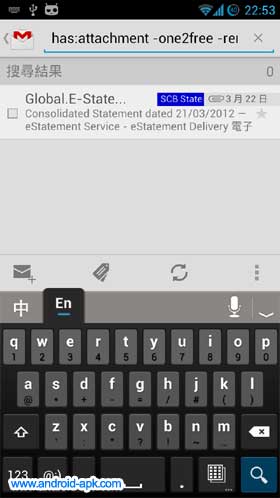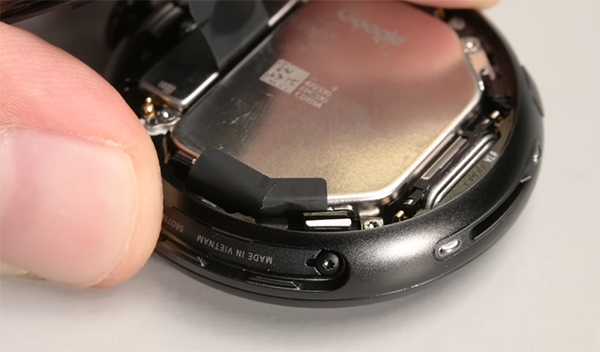Gmail 内的搜寻功能获得提升,可以利用不同的 Keywords 作不同类型的搜寻,如:收件人, 寄件人, 有附件, 日期, 邮件大小, 等等。
例如要搜寻来自 abc 的邮件,可以输入 from: abc。若想列出有附件的电邮,就输入has:attachment。

两种日期搜寻方式
日期方面的搜寻亦十分方便,如:after:2012/8/15 就代表搜寻 12年8月15日之后的邮件,另外,亦有一个简化写法 newer_than:2d 就代表最近两天的邮件,可以用 d, m, y 代表日月年。
这些搜寻指示可多个一并输入,留意两幅截图内都是输入多个搜寻指示。例如下图就是搜寻有附件但不含 one2free 的邮件。

其实还有很多不同的搜寻方式,下面就是从 Gmail Support 复制的完整的列表。
| Operator | Definition | Examples |
|---|---|---|
| from: | Used to specify the sender | Example: from:amy Meaning: Messages from Amy |
| to: | Used to specify a recipient | Example: to:david Meaning: All messages that were sent to David (by you or someone else) |
| subject: | Search for words in the subject line | Example: subject:dinner Meaning: Messages that have the word “dinner” in the subject |
| OR | Search for messages matching term A or term B* | Example: from:amy OR from:david Meaning: Messages from Amy or from David |
| – (hyphen) | Used to exclude messages from your search | Example: dinner -movie Meaning: Messages that contain the word “dinner” but do not contain the word “movie” |
| label: | Search for messages by label* *There isn’t a search operator for unlabeled messages | Example: from:amy label:friends Meaning: Messages from Amy that have the label “friends” Example: from:david label:my-family |
| has:attachment | Search for messages with an attachment | Example: from:david has:attachment Meaning: Messages from David that have an attachment |
| list: | Search for messages on mailing lists | Example: list:[email protected] |
| filename: | Search for an attachment by name or type | Example: filename:physicshomework.txt Example: label:work filename:pdf |
| ” “ | Used to search for an exact phrase* *Capitalization isn’t taken into consideration | Example: “i’m feeling lucky” Example: subject:”dinner and a movie” |
| ( ) | Used to group words Used to specify terms that shouldn’t be excluded | Example: from:amy (dinner OR movie) Example: subject:(dinner movie) |
| in:anywhere | Search for messages anywhere in Gmail* *Messages in Spam and Trash are excluded from searches by default | Example: in:anywhere movie Meaning: Messages in All Mail, Spam, and Trash that contain the word “movie” |
| in:inbox in:trash in:spam | Search for messages in Inbox, Trash, or Spam | Example: in:trash from:amy Meaning: Messages from Amy that are in Trash |
| is:important label:important | Search within messages that Priority Inbox considers important. | Example: is:important from:janet Meaning: Messages from Janet that were marked as important by Priority Inbox |
| is:starred is:unread is:read | Search for messages that are starred, unread, or read | Example: is:read is:starred from:David Meaning: Messages from David that have been read and are marked with a star |
| has:yellow-star has:red-star has:orange-star has:green-star has:blue-star has:purple-star has:red-bang has:orange-guillemet has:yellow-bang has:green-check has:blue-info has:purple-question | Search for messages with a particular star | Example: has:purple-star from:David Meaning: Messages from David that are marked with a purple star |
| cc: bcc: | Used to specify recipients in the cc: or bcc: fields* *Search on bcc: cannot retrieve messages on which you were blind carbon copied | Example: cc:david Meaning: Messages that were cc-ed to David |
| after: before: older: newer: | Search for messages sent during a certain period of time (using the date format yyyy/mm/dd) | Example: after:2004/04/16 before:2004/04/18 Meaning: Messages sent between April 16, 2004 and April 18, 2004.* *More precisely: Messages sent after 12:00 AM (or 00:00) April 16, 2004 and before April 18, 2004. |
| older_than newer_than | Similar to older and newer, but allows relative dates using d, m, and y for day, month, and year | Example: newer_than:2d Meaning: Finds messages sent within the last two days. |
| is:chat | Search for chat messages | Example: is:chat monkey Meaning: Any chat message including the word “monkey.” |
| deliveredto: | Search for messages within a particular email address in the Delivered-To line of the message header | Example: deliveredto:[email protected] Meaning: Any message with [email protected] in the Delivered-To: field of the message header (which can help you find messages forwarded from another account or ones sent to an alias). |
| circle: | Search for messages that were sent from someone who you added to a particular Google+ circle | Example: circle:friends Meaning: Any message that was sent by a person in your “Friends” circle. Examples: circle:”soccer friends (team blue)” or circle:”my \”fab four\”” |
| has:circle | Search for all messages that were sent from someone who you added to your Google+ circles | Example: has:circle Meaning: Any message that was sent by a person in any of your circles. |
| size: | Search for messages larger than the specified size in bytes | Example: size:1000000 Meaning: All messages larger than 1MB (1,000,000 bytes) in size. |
| larger: smaller: | Similar to size: but allows abbreviations for numbers | Example: larger:10M Meaning: All messages of at least 10M bytes (10,000,000 bytes) in size. |
| + (plus sign) | Match the search term exactly | Example: +unicorn Meaning: Finds messages containing “unicorn” but not “unicorns” or “unciorn” |
| rfc822msgid: | Find a message by the message-id header | Example: rfc822msgid:[email protected] Meaning: Locates the exact message with the specified SMTP1 message-id. Learn more about headers. |
| has:userlabels has:nouserlabels | Search for messages that have and have not had labels that you created applied to them. NOTE: Gmail applies labels to individual messages, not to conversation threads. | Example: has:nouserlabels Meaning: Finds all messages without any of your own labels (excludes automatic labels like inbox, spam, and trash). Since Gmail applies labels to individual messages, you might see results that appear to have labels; in this case, another message in the same conversation thread has had a label applied to it. |





